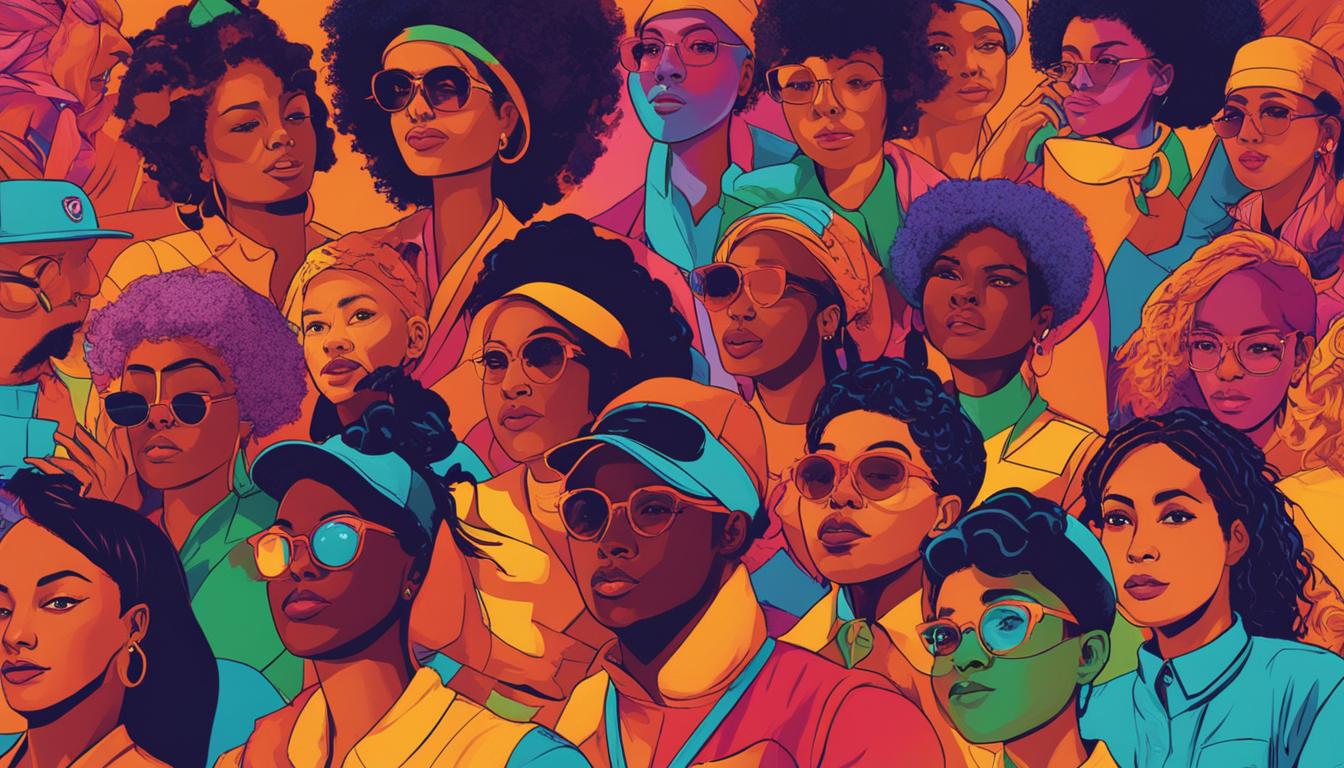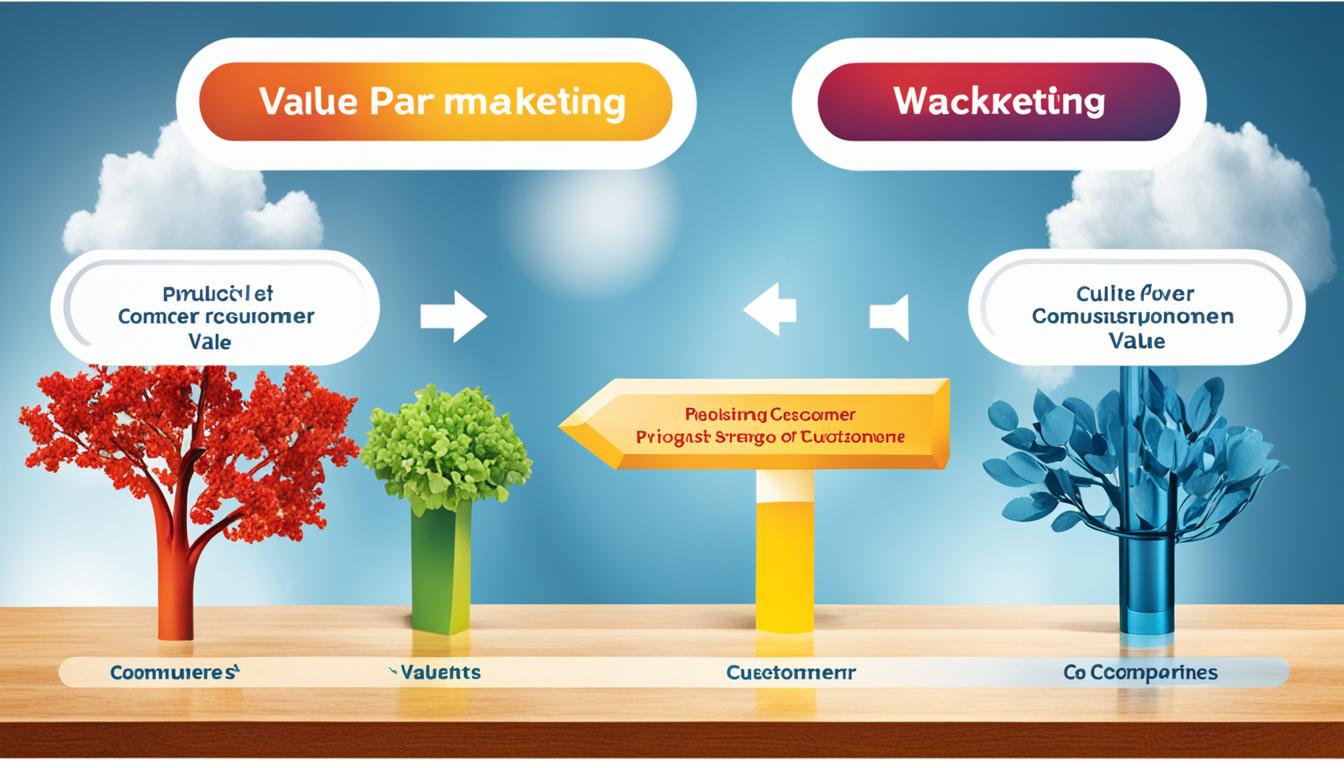Marketing agencies play a vital role in helping businesses develop and execute effective branding and advertising strategies. Behind the scenes, these agencies are composed of various roles and responsibilities, each contributing to the overall success of the agency. In this article, we will dive into the different marketing agency positions and their specific functions, providing you with a comprehensive overview of the marketing industry.
Key Takeaways
- Marketing agencies consist of different roles and responsibilities.
- Understanding these roles is crucial for a successful marketing agency career.
- Each role contributes to branding and advertising strategies.
- Marketing agencies offer a range of services, including SEO and social media management.
- Business development, account management, operations, strategists, design, and copywriting are among the key roles in marketing agencies.
Understanding Marketing Agency Jobs and Responsibilities
Marketing agencies are composed of several key roles, each with its own set of responsibilities. These roles are vital in ensuring the successful execution of branding and advertising strategies. In this section, we will delve into each role, highlighting the specific responsibilities and skills required for each position.
1. Business Development
The role of business development in a marketing agency is to drive growth by identifying and pursuing new clients, presenting solutions, and closing deals. Business development professionals play a crucial role in expanding the agency’s client base and generating new business opportunities.
2. Account Managers
Account managers serve as the primary point of contact for clients in a marketing agency. They are responsible for managing client relationships, understanding their needs, and ensuring the successful execution of marketing campaigns. Account managers play a vital role in maintaining client satisfaction and driving long-term partnerships.
3. Operations
The operations team in a marketing agency focuses on project management, resource allocation, and workflow optimization. They ensure the efficient and effective execution of marketing initiatives, taking care of the logistical aspects of campaign implementation.
4. Strategists
Strategists in marketing agencies are responsible for analyzing market trends, consumer behavior, and competition to develop data-driven marketing strategies. They work closely with clients to understand their goals and objectives, aligning them with creative and impactful marketing campaigns.
5. Design and Copywriting
The design and copywriting team in a marketing agency plays a crucial role in creating visually appealing assets and crafting persuasive written content. Designers bring creativity and visual storytelling to marketing campaigns, while copywriters effectively convey brand messages and drive desired actions.
6. Social Media Management
Social media management is responsible for developing and implementing social media strategies that align with client objectives. They create engaging content, interact with followers, and analyze social media performance to drive brand awareness and audience engagement.
7. Technologists
Technologists in marketing agencies focus on the technical aspects of digital marketing. They handle areas such as website development, data analysis, and marketing automation. Their expertise ensures the successful implementation of digital marketing strategies.
| Marketing Agency Position | Responsibilities | Skills Required |
|---|---|---|
| Business Development | – Identify and pursue new clients – Present solutions to clients – Close deals and generate new business | – Strong interpersonal and communication skills – Sales and negotiation abilities – Understanding of marketing strategies |
| Account Managers | – Manage client relationships – Understand client needs – Ensure successful campaign execution | – Excellent communication and relationship-building skills – Project management abilities – Marketing knowledge |
| Operations | – Oversee project management – Allocate resources efficiently – Optimize workflow | – Strong organizational and problem-solving skills – Ability to multitask and meet deadlines – Project management expertise |
| Strategists | – Analyze market trends and consumer behavior – Develop data-driven marketing strategies – Align strategies with client goals | – Proficiency in market research and analysis – Strategic thinking and creativity – Understanding of digital marketing platforms |
| Design and Copywriting | – Create visually appealing assets – Craft persuasive written content – Maintain brand consistency | – Creativity and design skills – Excellent written and verbal communication – Attention to detail |
| Social Media Management | – Develop social media strategies – Create engaging content – Analyze social media performance | – Knowledge of social media platforms – Content creation and storytelling abilities – Data analysis skills |
| Technologists | – Handle website development and maintenance – Analyze data for marketing insights – Implement marketing automation | – Technical proficiency in web development – Data analysis and interpretation skills – Familiarity with marketing automation tools |
What is a Marketing Agency?
A marketing agency is a professional service provider that specializes in assisting businesses with their online marketing efforts. These agencies offer a range of services, such as SEO, social media management, content creation, web design, and data analysis. They work closely with clients to develop tailored digital marketing strategies, execute campaigns, and measure performance. Each marketing agency has its own unique offerings and areas of expertise.
Services Offered by Marketing Agencies
Marketing agencies provide a wide array of services to cater to the diverse needs of businesses. Here are some of the key services offered:
- SEO: Marketing agencies optimize websites to improve search engine rankings and increase organic traffic.
- Social media management: They create and manage social media accounts, develop engaging content, and run effective advertising campaigns.
- Content creation: Marketing agencies produce high-quality content, such as blog posts, articles, videos, and infographics, to attract and engage target audiences.
- Web design: They design and develop visually appealing and user-friendly websites that enhance brand identity and provide seamless user experiences.
- Data analysis: Marketing agencies utilize data analytics tools to track and measure the effectiveness of marketing campaigns, identify areas for improvement, and make data-driven decisions.
Benefits of Working with a Marketing Agency
Collaborating with a marketing agency offers several advantages for businesses:
- Expertise and specialization: Marketing agencies have a dedicated team of professionals with expertise in various aspects of digital marketing, ensuring that businesses receive specialized services tailored to their needs.
- Cost-effective: Hiring a marketing agency eliminates the need for businesses to invest in full-time marketing staff and tools, making it a cost-effective solution for small and medium-sized enterprises.
- Access to the latest trends and technologies: Marketing agencies stay up-to-date with the ever-evolving digital marketing landscape, allowing businesses to leverage the latest trends and technologies to gain a competitive edge.
- Time-saving: Outsourcing marketing activities to an agency allows businesses to focus on their core operations while the agency handles the marketing tasks efficiently and effectively.
Choosing the Right Marketing Agency
When selecting a marketing agency, it’s important to consider the following factors:
- Experience and expertise: Look for agencies with relevant industry experience and expertise in your specific niche or target market.
- Client portfolio: Review the agency’s client portfolio to gauge their track record and the results they have achieved for their clients.
- Communication and collaboration: Choose an agency that values open communication and collaboration, as it is crucial for a successful partnership.
- Transparency and reporting: Ensure that the agency provides regular reports and updates on the progress and performance of your marketing campaigns.
By partnering with the right marketing agency, businesses can strengthen their online presence, reach their target audience effectively, and achieve their marketing goals.
| Benefits of Working with a Marketing Agency | Factors to Consider when Choosing a Marketing Agency |
|---|---|
| Expertise and specialization | Experience and expertise |
| Cost-effective | Client portfolio |
| Access to the latest trends and technologies | Communication and collaboration |
| Time-saving | Transparency and reporting |
Business Development in Marketing Agencies
In marketing agencies, business development professionals play a critical role in driving business growth and expanding the agency’s client base. These individuals are responsible for identifying new clients, presenting solutions, and closing deals. Through their efforts, they contribute to the overall success and profitability of the agency.
Business development in marketing agencies involves various roles and responsibilities. Here are some key aspects:
1. Identifying New Opportunities
Business development professionals actively seek out potential clients and opportunities by conducting market research, attending industry events, and leveraging their network. They identify businesses that can benefit from the agency’s services and solutions.
2. Building Relationships
Once potential clients are identified, business development professionals establish and foster relationships with key decision-makers. They engage in effective communication, tailored pitches, and strategic networking to build trust and rapport.
3. Presenting Solutions
Business development professionals collaborate with the agency’s internal teams to develop customized solutions and proposals for potential clients. They present these solutions, showcasing the agency’s expertise, capabilities, and value proposition.
4. Closing Deals
Ultimately, the goal of business development professionals is to close deals and secure new clients for the agency. They negotiate contracts, address any objections or concerns, and work towards mutually beneficial agreements.
Effective business development strategies involve a combination of market knowledge, relationship-building skills, and persuasive communication. By successfully generating new business opportunities, these professionals contribute to the agency’s growth and success.
Below is a visual representation of the roles and responsibilities of business development professionals in marketing agencies:
| Roles | Responsibilities |
|---|---|
| Identifying new opportunities | Conduct market research |
| Attend industry events | |
| Leverage network | |
| Building relationships | Engage in effective communication |
| Tailored pitches | |
| Strategic networking | |
| Presenting solutions | Collaborate with internal teams |
| Develop customized solutions | |
| Showcase expertise and value | |
| Closing deals | Negotiate contracts |
| Address objections and concerns | |
| Work towards mutually beneficial agreements |
Account Managers in Marketing Agencies
Account managers play a crucial role in marketing agencies as they serve as the primary point of contact for clients. They are responsible for managing client relationships, understanding their needs, and ensuring the successful execution of marketing campaigns.
One of the key responsibilities of account managers is to act as a liaison between the client and the agency. They work closely with clients to gather requirements, provide updates on campaign progress, and address any concerns or issues that may arise. By building strong relationships with clients, account managers foster trust and ensure client satisfaction.
Additionally, account managers are responsible for project management and coordination within the agency. They collaborate with different teams, such as strategists, designers, and copywriters, to ensure that all aspects of a marketing campaign align with the client’s goals and objectives. Account managers also monitor campaign performance, analyze data, and provide actionable insights to optimize future strategies.
To excel in this role, account managers need to possess excellent communication and interpersonal skills. They must be able to effectively convey client requirements to the agency’s internal teams and ensure that projects are delivered on time and within budget. Attention to detail, problem-solving abilities, and a strong understanding of marketing principles are also essential.
Responsibilities of Account Managers in Marketing Agencies:
- Act as the primary point of contact for clients
- Build and maintain strong client relationships
- Understand client needs and objectives
- Coordinate and collaborate with internal teams
- Manage project timelines and budgets
- Monitor campaign performance and provide insights
- Ensure client satisfaction and address concerns
Skills Required for Account Managers in Marketing Agencies:
- Excellent communication and interpersonal skills
- Strong project management abilities
- Ability to multitask and prioritize tasks
- Analytical mindset and data-driven approach
- Understanding of marketing principles and strategies
- Problem-solving and decision-making skills
| Responsibilities | Skills |
|---|---|
| Act as the primary point of contact for clients | Excellent communication and interpersonal skills |
| Build and maintain strong client relationships | Strong project management abilities |
| Understand client needs and objectives | Ability to multitask and prioritize tasks |
| Coordinate and collaborate with internal teams | Analytical mindset and data-driven approach |
| Manage project timelines and budgets | Understanding of marketing principles and strategies |
| Monitor campaign performance and provide insights | Problem-solving and decision-making skills |
| Ensure client satisfaction and address concerns |
Operations in Marketing Agencies
Operations play a crucial role in the success of marketing agencies. From overseeing project management to resource allocation and workflow optimization, the operations team ensures the efficient and effective execution of marketing initiatives. They are responsible for coordinating various aspects of the agency’s operations to deliver high-quality services and meet client expectations.
Project Managers
Project managers are the backbone of marketing agency operations. They are responsible for planning, organizing, and managing the execution of marketing projects from start to finish. Project managers collaborate with teams across the agency to define project goals, allocate resources, establish timelines, and monitor progress. Their role is essential in ensuring projects are delivered on time, within budget, and according to client specifications.
Agency Directors
Agency directors oversee the overall operations of a marketing agency. They provide strategic guidance, set agency goals, and make critical business decisions. Agency directors are responsible for cultivating a positive work environment, fostering a culture of creativity and collaboration, and driving agency growth. They play a vital role in building and maintaining strong client relationships, identifying new business opportunities, and staying ahead of industry trends.
| Responsibilities | Project Managers | Agency Directors |
|---|---|---|
| Project planning and management | ✓ | ✓ |
| Resource allocation | ✓ | ✓ |
| Team coordination and communication | ✓ | ✓ |
| Budget management | ✓ | ✓ |
| Client relationship management | ✓ | |
| Business development | ✓ | |
| Strategic planning | ✓ |
The collaboration between project managers and agency directors ensures smooth operations and the successful delivery of marketing campaigns. By working together, they drive the agency’s growth, maintain client satisfaction, and contribute to the overall success of the marketing agency.
Continue reading to learn about the critical role strategists play in marketing agencies.
Strategists in Marketing Agencies
In marketing agencies, strategists play a vital role in driving the success of branding and advertising campaigns. They are responsible for analyzing market trends, consumer behavior, and competition to develop data-driven marketing strategies that align with client objectives and drive measurable results.
As experts in their field, strategists possess a deep understanding of the ever-evolving digital landscape and employ their knowledge to create effective marketing plans that maximize the impact of a brand’s message. They utilize a combination of research, industry insights, and creative thinking to develop innovative strategies that help businesses reach their target audiences and achieve their marketing goals.
Strategists work collaboratively with other teams within the marketing agency to ensure the seamless implementation of their strategies. They provide guidance and direction to designers, copywriters, and technologists, ensuring that all elements of a marketing campaign align with the overall strategic vision.
The responsibilities of a strategist in a marketing agency include:
- Analyzing market trends and competitive landscapes
- Identifying target audiences and consumer behavior patterns
- Developing comprehensive marketing strategies
- Creating data-driven campaigns that drive customer engagement
- Measuring and analyzing campaign performance
- Adapting strategies based on data and market insights
Successful strategists in marketing agencies possess a unique combination of analytical skills, creativity, and strategic thinking. They are able to translate complex data into actionable insights and develop marketing plans that resonate with consumers.
The Role of Strategists in Marketing Agencies
Strategists play a pivotal role in shaping the success of marketing campaigns. Their expertise and ability to understand market dynamics allow them to guide businesses in making informed decisions that drive growth and generate tangible results. By leveraging their knowledge and skills, strategists help clients navigate the complexities of the digital landscape and achieve their marketing objectives.
Table: Key Responsibilities of Strategists in Marketing Agencies
| Responsibilities | Expertise Required |
|---|---|
| Conducting market research and analysis | Data analysis, market research |
| Developing data-driven marketing strategies | Strategic thinking, creativity |
| Collaborating with cross-functional teams | Teamwork, communication |
| Measuring and analyzing campaign performance | Data analysis, reporting |
| Adapting strategies based on market insights | Flexibility, adaptability |
Design and Copywriting in Marketing Agencies
Design and copywriting play integral roles in the success of marketing agencies. Designers bring creativity, visual storytelling, and aesthetic appeal to marketing campaigns, while copywriters effectively convey brand messages and drive desired actions. These two roles work closely together to create compelling and influential marketing materials.
The Role of Designers
Designers in marketing agencies are responsible for visualizing and materializing the brand’s message through engaging and visually stunning assets. They possess a keen eye for detail, strong aesthetic sensibilities, and the technical skills necessary to bring ideas to life. Whether it’s designing logos, websites, social media graphics, or print collateral, designers use their expertise to ensure that every element resonates with the target audience. By incorporating design principles and utilizing industry-standard software, designers create impactful visuals that effectively communicate the brand’s values and identity.
The Role of Copywriters
Copywriters in marketing agencies are masters of the written word. They craft compelling, persuasive, and influential content that captivates the audience and sparks action. These wordsmiths have a deep understanding of brand voice and tone, allowing them to create copy that aligns with the brand’s personality and resonates with its target market. Copywriters possess excellent research and storytelling skills, allowing them to generate captivating narratives that drive engagement and conversions. Whether it’s writing website content, social media captions, ad headlines, or blog articles, copywriters bring the brand’s message to life through their craft.
Collaboration and Synergy
Designers and copywriters in marketing agencies work collaboratively to create cohesive and impactful marketing campaigns. By combining their respective talents and expertise, they ensure that the visuals and messaging seamlessly integrate to tell a compelling story and achieve the desired marketing objectives. The synergy between design and copywriting enhances the overall effectiveness and impact of the marketing materials, resulting in higher engagement and conversion rates.
Skills and Expertise Needed
To succeed in design and copywriting roles in marketing agencies, professionals must possess a combination of technical skills and creative abilities. Designers should be proficient in design software such as Adobe Photoshop, Illustrator, and InDesign, as well as have a solid understanding of design principles, color theory, and typography. Copywriters, on the other hand, should have excellent writing, editing, and proofreading skills, along with a deep understanding of SEO and content marketing strategies. Both roles require attention to detail, creativity, the ability to meet deadlines, and a strong portfolio that showcases their work.
Conclusion
In conclusion, a career in the marketing agency industry offers extensive opportunities for growth and professional development. Each role within a marketing agency plays a vital role in driving successful branding and advertising strategies. Whether you aspire to be a business development professional, an account manager, or a creative designer, understanding the duties and responsibilities associated with these roles is crucial.
Working in a marketing agency requires individuals to possess a diverse set of skills, such as strategic thinking, creativity, communication, and analytical abilities. The collective efforts of these roles contribute to the overall success of an agency and help businesses achieve their marketing goals.
Furthermore, collaborating with a marketing agency can greatly benefit businesses by leveraging the expertise and industry knowledge of professionals in various roles. By partnering with an agency, businesses can tap into a wide range of services tailored to their specific needs, resulting in effective digital marketing strategies and increased brand visibility.
Whether you’re considering a career in the marketing agency industry or seeking the services of a marketing agency, it is essential to have a clear understanding of the various roles and their contributions. By recognizing the importance of each role, businesses can make informed decisions and individuals can pursue rewarding careers in this dynamic and ever-evolving field.
FAQ
What are the different roles in a marketing agency?
The different roles in a marketing agency include business development, account managers, operations, strategists, design, copywriting, social media management, and technologists.
What does a marketing agency do?
A marketing agency specializes in assisting businesses with their online marketing efforts, offering services such as SEO, social media management, content creation, web design, and data analysis.
What are the responsibilities of business development professionals in marketing agencies?
Business development professionals in marketing agencies are responsible for driving business growth, identifying and pursuing new clients, presenting solutions, and closing deals.
What is the role of account managers in marketing agencies?
Account managers in marketing agencies serve as the primary point of contact for clients, manage client relationships, understand their needs, and ensure the successful execution of marketing campaigns.
What is the role of the operations team in marketing agencies?
The operations team in marketing agencies oversees project management, resource allocation, and workflow optimization to ensure the efficient and effective execution of marketing initiatives.
What do strategists do in marketing agencies?
Strategists in marketing agencies analyze market trends, consumer behavior, and competition to develop data-driven marketing strategies that align with client objectives and drive measurable results.
What are the responsibilities of designers and copywriters in marketing agencies?
Designers in marketing agencies create visually appealing assets, while copywriters craft persuasive written content to convey brand messages and drive desired actions.







